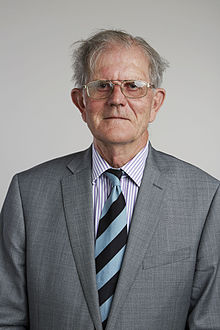AWF Edwards
Anthony William Fairbank Edwards , mostly quoted by AWF Edwards, (born October 4, 1935 in London ) is a British statistician, geneticist and evolutionary biologist.
His father was the surgeon Harold C. Edwards and his older brother the (medical) geneticist John H. Edwards . Edwards attended Uppingham School and studied at Cambridge University . As a post-doctoral student, he was with Luigi Luca Cavalli-Sforza at the University of Pavia from 1961 to 1964 , was one year at Stanford University and then three years as a senior lecturer in statistics at the University of Aberdeen with DJ Finney . In his own words, he found no support for human genetic research at the time and went to Cambridge in 1968, where he devoted himself to writing books. He became a Fellow of Gonville and Caius College, Cambridge, where he became Professor of Biometrics. He holds a D.Sc. and a Litt.D. and is honorary professor at the University of Pavia.
With Cavalli-Sforza he developed statistical, computer-based methods to obtain evolutionary trees from genetic data (in particular maximum likelihood). He is a student of Ronald Aylmer Fisher and a proponent of his likelihood concept, which he wrote a book about and which he sees as fundamental to any kind of statistical inference. He wrote a book on mathematical genetics.
He also wrote books on Pascal's triangle , Venn diagrams , the history of statistics, and Gregor Mendel's on good statistical results (a topic that Ronald Fisher dealt with in the 1930s).
He is also known for rejecting Richard Lewontin's view that race is not a taxonomic concept in humans. He published this in 2003 (Lewontins Errtum, English: Lewontin's Fallacy). According to Edwards, Lewontin was guided by political prejudices and made fundamental mistakes in relation to population genetics (see Racial Theory # Criticism and Overcoming ).
He is a Fellow of the Royal Society (2015). Edwards is a passionate glider pilot.
Fonts
- Likelihood, Cambridge UP 1972, expanded reprint at Johns Hopkins University Press 1992
- Pascal's arithmetic triangle, the story of a mathematical idea, London: Charles Griffin 1987, Johns Hopkins University Press 2002
- Foundation of mathematical genetics, Cambridge UP, 1977, 2nd edition 2000
- with HA David: Annotated Readings in the History of Statistics, Springer, 2001
- Cogwheels of the Mind: The Story of Venn Diagrams, Johns Hopkins University Press, 2004
- with Milo Keynes, Robert Peel (Eds.): A Century of Mendelism in Human Genetics, CRC Press, Boca Raton, Florida 2004
- with A. Franklin, DJ Fairbanks, DL Hartl, T. Seidenfeld: Ending the Mendel-Fisher Controversy, University of Pittsburgh Press, 2008
- Statistical methods in scientific inference, Nature, Vol. 222, 1969, pp. 1233-1237.
- The history of likelihood, International Statistical Review, Volume 42, 1974, pp. 9-15.
- Are Mendel's results really too close ?, Biological Reviews, Volume 61, 1986, pp. 295-312.
- The origin and early development of the method of minimum evolution for the reconstruction of phylogenetic trees, Systematic Biology, Volume 45, 1996, pp. 79-91.
- The Genetical Theory of Natural Selection, Genetics, Vol. 154, 2000, pp. 1419-1426.
- Human genetic diversity: Lewontin's fallacy, BioEssays, Volume 25, 2003, pp. 798-801.
Web links
Individual evidence
- ↑ Rhazib Khan: Ten questions for AFW Edwards , Gene Expression, Blog, August 28, 2006
- ↑ Cavalli-Sforza, Edwards, Analysis of human evolution, Genetics Today, Volume 3, 1964, pp. 923-933
- ↑ Cavalli-Sforza, Edwards: Reconstruction of evolutionary trees, in: VH Heywood, J. McNeill (Eds.), Phenetic and Phylogenetic Classification, London, 1964, pp. 67-76
- ↑ He first met him in 1956 and has been in contact with Fisher for the last six years of his life. Although he attended Henry Daniels lectures on statistics at Cambridge, he sees himself primarily as a student of Fisher, who recommended his book Statistical Methods for Research Workers for study. Fisher was also at Gonville and Caius College, Cambridge.
- ↑ Lewontin, The Apportionment of Human Diversity, Evolutionary Biology, Volume 6, 1972, pp 391-398
| personal data | |
|---|---|
| SURNAME | Edwards, AWF |
| ALTERNATIVE NAMES | Edwards, Anthony William Fairbank |
| BRIEF DESCRIPTION | British statistician and geneticist |
| DATE OF BIRTH | 4th October 1935 |
| PLACE OF BIRTH | London |
